Role Play: Night Elf lore and character development
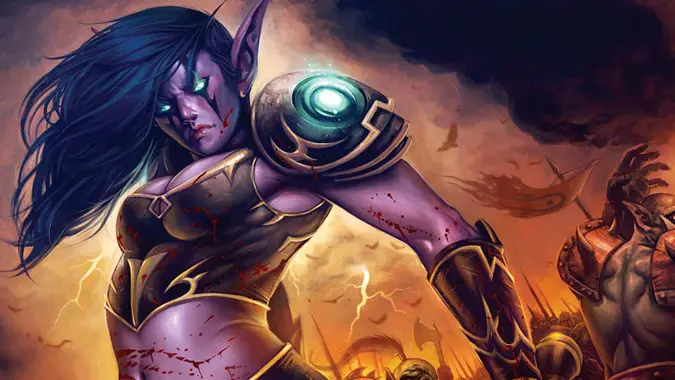
Night Elves are a conundrum — on the one hand, you have a race which is very, very old. Not quite as ancient as the Draenei, but old enough that they pre-date almost every other native species on Azeroth. They got a dose of immortality at the end of the War of the Ancients, then lost it at the end of the Third War. So it’s not at all impossible to find an ancient Night Elf out there.
But on the other hand, they’re also fairly young — not in terms of age, but in terms of interacting with the rest of the world. Night Elves typically lived lives of isolation, and they only left that isolation around 10-12 years ago. What goes on in the mind of a Night Elf that’s lived this kind of life? Let’s dive in.
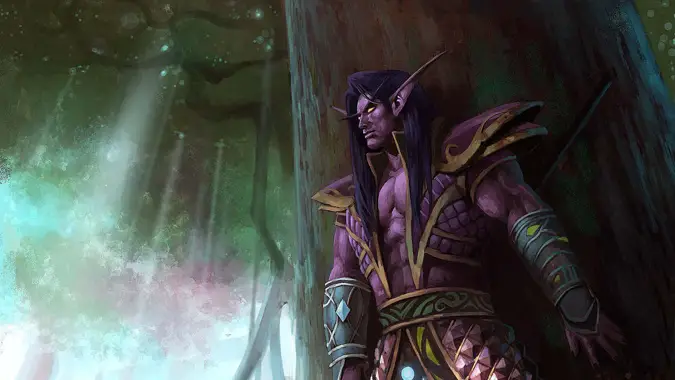
Night Elf society
We have a lot of history about Night Elves and Night Elf culture readily available for research, but that’s just history. It’s not how Night Elves think, necessarily, it’s just what they’ve done. Night Elf lives are lengthy, far longer than any of their allies, save the Draenei. It’s not at all impossible to find a Night Elf that was around during the War of the Ancients — Tyrande and Malfurion are two big examples and leaders.
Being isolated wasn’t a major decision, it was simply how things were, an ingrained part of Night Elf society. Because of this, that decision to join the Alliance was a pretty big deal — it meant the centuries of quietly staying in the forests were over. And it meant suddenly, there were allies to contend with, learn about, and to learn to get along with.
Surprisingly, this hasn’t really been an issue for the Night Elves — at least not externally. Tyrande and Malfurion set a groundbreaking example, and the rest of the Night Elves followed it. It’s now commonplace to find other races wandering the streets of Darnassus, or visiting the Temple of the Moon. But that doesn’t meant that everyone is happy with it.
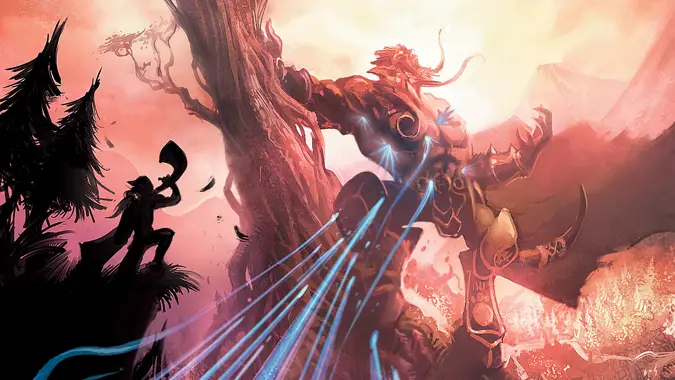
Ideas old and new
Night Elves live lengthy lives, and were given a gift of immortality at the end of the War of the Ancients. As long as they took care of the World Tree Nordrassil, they would live forever, theoretically. But the Third War ended with an explosion that not only nearly destroyed the World Tree, it also shattered the Night Elves’ immortality in the process.
Much like their isolated nature, immortality was something pretty much every Night Elf out there had grown accustomed to — it was simply something they were. The sudden absence of that immortality affected everyone in a different way — some weren’t bothered by it, some likely saw it as a necessary sacrifice, and some — like Fandral Staghelm — immediately began looking for ways to get it back.
Both the immortality issue and the sudden alliance with so many species both old and new were enough to cause some major rifts in Night Elf culture. Some trusted that Tyrande and Malfurion knew what they were doing. Others questioned their leadership — some in secret, and some openly. Maiev was a notable dissenter, along with Fandral and plenty of others.
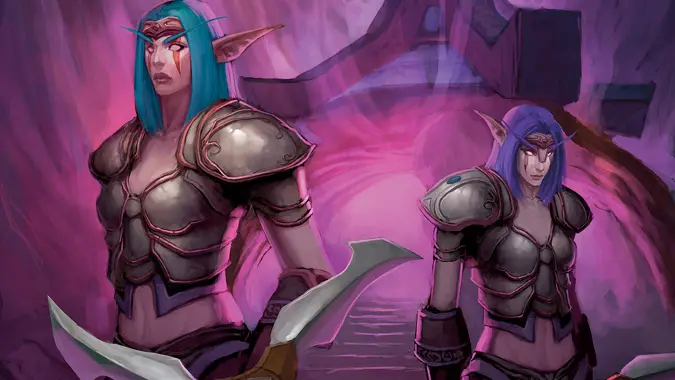
Ancients in a new world
These are both points that would absolutely affect a Night Elf character, although it might not be outwardly apparent. Their relationships with the people around them are a reflection of these major societal shifts. They might not be comfortable in crowds of alien species they don’t know — or they could be excited to learn about the rest of the world and how it has evolved. They could be fully confident in their leaders, or they could be silently wondering why they can’t just go back to the days of old and the way things were — the way things are supposed to be.
Despite it being a fairly lengthy stretch of time for Humans, for Night Elves, they’ve only been in the Alliance for an incredibly short period of time. For a species that has been shown to live for 10,000 years due to that stretch of immortality, 10-12 years is just the blink of an eye. They might be well acquainted with the other races of the world by now, but that length of time is impossibly small compared to the rest of their lives.
What does this mean? It means that it wouldn’t be too far-fetched for a Night Elf character to quietly view the other races of Azeroth as just a little inferior. It wouldn’t be out of hand to suggest that these other races don’t really know what they’re doing, or to dismiss their opinions or suggestions outright. Conversely, a Night Elf might be yearning to hear those new opinions and ideas, after chafing under the yoke of so many, many years of steadfast tradition.
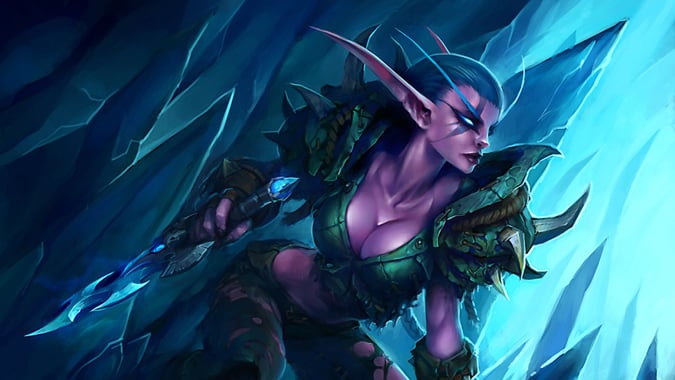
Current events for Night Elves
It also means that a lot of the present-day events in Azeroth are at once shocking, and also hauntingly familiar. The Night Elves were there for the first arrival of the Burning Legion. They know — possibly better than any other species on Azeroth, save the Draenei — exactly what the Legion’s return means for the world. They know how important it is to shut them down. And they understand that this may mean sacrificing some incredibly important things in the process, like the immortality they lost at the end of the Third War.
For some, that might feel a little unfair. They’ve already sacrificed so much, and now it looks like they’ll have to sacrifice more? Some astute Night Elves might note that joining the Alliance hasn’t exactly done wonders for the Night Elves as a whole. It did little to prevent the Orcs from attacking in Ashenvale, there wasn’t a lot of help offered to the Night Elves after the Cataclysm. In fact, it might feel like the Alliance is doing more asking for help than actually providing anything of substance.
For others, the Alliance offers something strange and new. Thousands of years in isolation might seem like a walk in the park, but being out of that isolation and interacting with the rest of the world is utterly intriguing. The short lives of the other races in the world don’t seem to be holding them back in the slightest — if anything, they attack the world with fascinating fervor and passion.
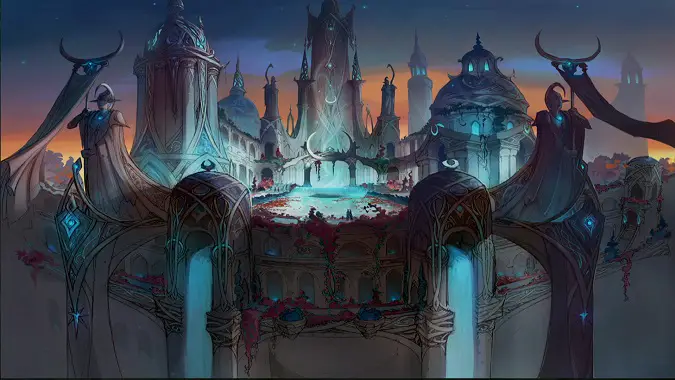
Legion and Night Elf roleplay
Legion promises some interesting lore moments for Night Elves — the reveal of the Nightborne and the remains of Suramar are apt to be the source of another cultural shock. It’s another shard of history in a long, long legacy of cultural shifts and splits for the Night Elves. And if your Night Elf thought the Blood Elves were some kind of horrifying aberration, the Nightborne are on another level altogether.
In addition, the introduction of Demon Hunters is another shock — Illidan Stormrage wasn’t exactly looked on with kindness during Burning Crusade. Demon Hunters as a whole are generally looked down upon, for seemingly embracing the Legion’s demonic powers. At the same time, the world appears to need them right now, which means your Night Elf is going to be face-to-face with them whether they like it or not.
As a human being, it can be hard to wrap your head around a character with an impossibly long life span. The age of your Night Elf will help determine how much weight or thought they give to the cultural shifts mentioned above. Night Elves that have been around since the War of the Ancients are definitely affected more heavily by these major changes in Night Elf society. But for the younger generation — the new generation — all these changes are simply reminders that perhaps it isn’t necessary, or advisable, to lean too heavily on the past.
Please consider supporting our Patreon!
Join the Discussion
Blizzard Watch is a safe space for all readers. By leaving comments on this site you agree to follow our commenting and community guidelines.
 @Shadesogrey
@Shadesogrey



